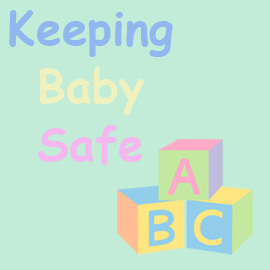To recognize September as Baby Safety Month, a series of three articles on safety subjects during this month.
Home should be a safe haven for everyone, especially babies and children, but it is easy to overlook potential safety risks that put kids in danger. Baby-proofing a home’s interior requires careful scrutiny of each room. Professional baby-proofers recommend that parents get on their knees and look through every room from the same level as a young child.
Some of the most common hazards are choking/airway obstruction and accidental poisoning. Other dangers include burns, drowning, falls and the danger of things falling on children and environmental hazards.
SafeKids USA recommends the following tips to help protect children:
Choking/airway obstruction
- Keep small objects such as buttons, coins, small toys, beads, and marbles out of young children’s reach. Hard candy, popcorn, nuts, and corn chips are potential hazards as well. Balloons and balloon pieces can also cause choking.
- Store plastic bags out of children’s reach.
Environmental issues
- Install smoke alarms and carbon monoxide detectors in every sleeping area and test them every month. Change the batteries bi-annually.
- Have heating systems checked every year.
- Test homes built before 1978 for lead paint.
Falling hazards
- Install safety guards on windows above the first floor.
- Never trust a screen to prevent a child from falling out of a window. Supervise kids around open windows.
- Move furniture away from windows and keep them locked when closed.
- Install safety gates at top and bottom of staircases.
- Ensure that stairways and hallways are well lit and clear of clutter.
- Do not leave babies alone on beds, sofas, or changing tables.
- Use safety straps with infant carriers, strollers, swings, and high chairs.
- Do not use baby walkers on wheels.
- Anchor shelves and unstable furniture to floor or wall to prevent them from being pulled over by children.
Fire, burn dangers
- Do not leave candles, matches, lighters, or flammable materials within children’s reach. Never leave burning candles unattended.
- Do not place space heaters within children’s reach or near anything flammable.
- Use back burners on stoves. Turn pot handles to the back.
- Do not hold children while cooking or serving hot food.
- Test temperature of food before giving to small children or babies.
- Set water heater temperature at less than 120 degrees Fahrenheit. Keep baby’s bath water around 100 degrees Fahrenheit.
Drowning hazards
- Never leave babies or young children unattended in bathtub.
- Keep toilet lids down and locked and bathroom and utility room doors closed.
- Do not leave water standing in the tub or sink, and do not leave buckets containing water or liquid unattended.
Accidental poisoning
- Install locks/safety latches on cabinets containing potential poisons such as cleaning supplies, medicine, makeup, liquor, pesticides, etc. Store these items in the highest cabinets and never underestimate a child’s ability to climb.
- Do not leave potentially poisonous products unattended while in use.
- Follow dosage instructions when giving medicine to children and use child resistant packages.
- Never refer to medicine or vitamins as candy.
- Know which houseplants are poisonous and keep them out of reach.
- If poisoning is suspected, call the Poison Control Center at 1-800-222-1222 or physician immediately. Do not make child vomit.
- Keep activated charcoal on hand to be used only if advised by Poison Control Center or physician. Ipecac is no longer recommended as a treatment for poisoning.
Miscellaneous
- Keep electrical outlets covered when not in use.
- Consider installing cordless window coverings or secure cords out of children’s reach. According to the Consumer Product Safety Commission, over 200 babies/young children have died from accidental strangulation caused by window blind cords.
- Store glass items, scissors, and knives out of the reach of young children.
- Call 911 if child collapses, can’t breathe, is having a seizure, or choking.
- Learn CPR and the Heimlich maneuver.
Numerous dangers exist in homes, and it would be impossible to list or anticipate them all. This information is intended to be a guide for getting started but does not cover every possible hazard/danger. Discuss safety issues with pediatricians and/or consult a baby-proofing professional if you have questions about home safety.


